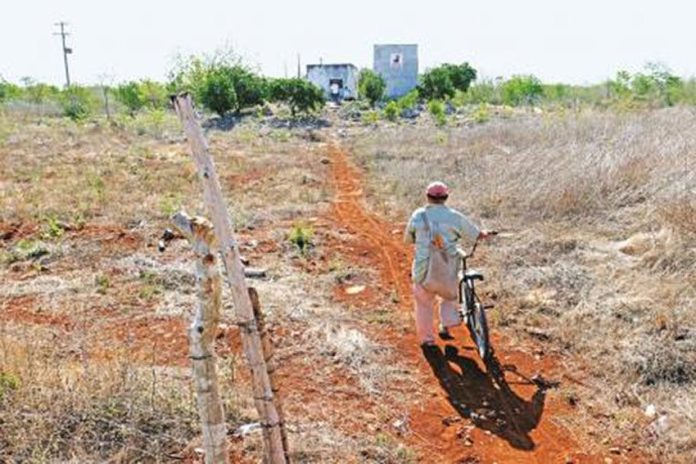At least 34 federal and state-funded agricultural infrastructure projects in Yucatán that were slated to be built between 2014 and 2016 amounted to nothing, according to the state’s College of Agronomists.
College president Lorenzo Alvarado Sosa said that 15 of the abandoned projects involved the installation of irrigation systems, while the other 19 included the construction of greenhouses, a solar-powered agricultural processing plant and an organic farm.
The Yucatán state government and federal agricultural authorities announced the latter two projects with pomp and circumstance four years ago.
But neither project went beyond the planning stage and thieves looted the few materials that arrived at the proposed sites in the municipality of Tahmek, such as solar panels and parts for an irrigation system.
Similar scenarios played out on the other projects which were planned for other rural areas in the state, with the money allocated ending up in the pockets of unscrupulous government officials and contractors, according to intended beneficiaries.
“They cheated us, we thought that they would help us. We trusted them, that’s why we gave them the 450,000 pesos [US $21,850 at today’s exchange rate] from the checks. We cashed them, gave the project engineers [the money] and then they disappeared,” Tahmek resident María Cornelia Keb Canul told the newspaper El Universal.
She and at least 17 other producers from the area had planned to grow habanero chiles, citrus fruits and other crops to supply the planned processing plant.
Keb Canul said that two engineers — one each from the federal Agriculture Secretariat (Sagarpa) and the state government’s rural development department — personally accompanied her to a bank where she cashed the check and handed over the funds with the assurance that they would start the work quickly.
“That day [in 2014], after we cashed the check and gave them the money, they invited us to have breakfast . . . in Mérida. Then they brought us back to the farm and never returned,” she said.
The 54-year-old woman and her husband Silvino Puc Ek told El Universal that they didn’t report what had happened out of fear that they wouldn’t receive any government support in the future and because the engineers kept the documents related to the project.
Another factor that complicates accountability is that under Sagarpa rules, project beneficiaries are required to hand over the funds that they have been granted to officials or contractors, although it’s the farmers who remain legally responsible for the execution of the work.
A Sagarpa official who spoke to El Universal on the condition of anonymity said the absence of responsibility on the part of anyone but the beneficiaries of the projects had led to the practice of taking the cash and running, so to speak, becoming commonplace.
The same two state and federal officials who swindled Keb Canul also failed to deliver on a promised farm project after receiving funds in 2014 from a cooperative made up of eight farmers in Tahmek.
Alfonso Baas Casanova, an ejidatario, or communal landowner, and the cooperative’s head told El Universal that he cashed a check for 460,000 pesos and gave the proceeds to Máximo Paredes Rodríguez of the state government’s rural development department, and Sergio Muñoz de Alba of Sagarpa.
Again, the understanding was that work on the project would start soon but, as before, the farmers never saw the men again. The site that today should be a working, organic farm instead lies abandoned.
Alvarado Sosa, who worked for the state government before heading up the Yucatán College of Agronomists, said that frauds of this type are not only discouraging for farmers but also leave many with no other option than to abandon the countryside and look for opportunities elsewhere.
“There are more and more migrants who go to Mérida and Cancún, more migrants who go abroad, there are few or none who want to sow crops. The Yucatecan countryside yields profits but we have to be well-organized, apply the resources honestly and really get to work,” he said.
Source: El Universal (sp)
